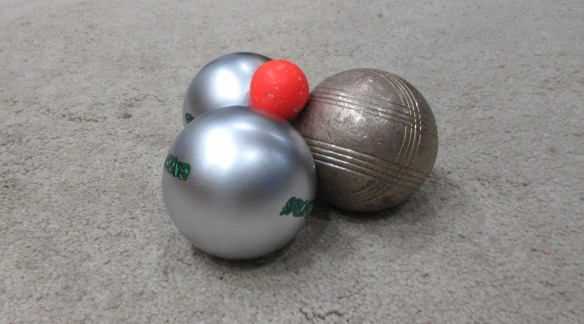[Posted on April 26, 2021]
This post discusses an unusual situation that actually does occasionally happen. It contains the answer to one of our quizzes.
Two players are playing singles. In the middle of the second mène (end, round), the score is 1-0. This happens.

A) Is the jack dead or alive?
B) Assuming the jack is dead, which player plays the next boule? Why?
C) Assuming the jack is alive, which player plays the next boule? Why?
ANSWERS
A) Is the jack dead or alive?
The jack is alive. People sometimes say that the jack is dead because it’s “not on the terrain”. That is wrong. In the context of the rules of petanque, “on the terrain” means “within the boundaries of the terrain”; it doesn’t mean “sitting on the ground”. A boule or jack sitting on top of a pile of boules (within the boundaries of the terrain, of course) is still alive.
B) Assuming the jack is dead, which player plays the next boule?
Why?
If the jack is dead, the mene (end, round) is over. The next boule to be thrown is the first boule in the next mene. The quiz doesn’t provide enough information for you to know which player throws that boule. All you can do is report the possibilities.
The player that starts a mene is the player that last scored a point. At the start of the next mene, mene 3, which player last scored a point? There are two possibilities.
B1) If, when the jack dies and mene 2 ends, only one player has unplayed boules, that player wins the mene. He scores as many points as he has unplayed boules. Since he is the last player to score a point, he throws the jack and the first boule to start the next mene.
Or…
B2) If, when the jack dies and mene 2 ends, neither or both players have unplayed boules, neither team wins the mene and neither team scores any points— the mene is scoreless (“la mène est nulle”).[1] The player who last scored a point was the player who scored a point in the previous mene, mene 1. So he is the player that throws the jack and the first boule to start the next mene.
When something like B2 (a scoreless mene) happens, people sometimes say that the next mene is a “re-do” or “do over” of the mene that just finished. That’s not true. In our example, mene 2 isn’t erased from the history books and then played again. Mene 2 goes into the books as a mene in which neither team scored any points. Then the game moves on to the next mene, in this case: mene 3.
When something like B2 (a scoreless mene) happens, people sometimes say that the next mene is started by the same team that started the mene that just finished. That’s true. Technically, the next mene is started by the team that last scored a point. After a scoreless mene, the team that last scored a point is the same as it was at the start of the mene. THAT is why the same team starts the next mene. (It’s NOT because the mene was erased and is being played again.)
C) Assuming the jack is alive, which player plays the next boule? Why?
If only one player has unplayed boules, the question isn’t interesting… obviously that player throws next. So we assume that both players still have at least one unplayed boule.
The player who throws the next boule is the player who threw the last boule. The interesting question is WHY.
The photograph shows an “equidistant boules” situation; the best boules of both players are equally distant from the jack. In an equidistant boules situation, neither team has the point. When neither team has the point, we say that it is a null point (“point nul”).[2]
After a player throws a boule that creates a null point, the teams play alternately until one of them has the point, starting with the team that threw the boule that created the null point. So the answer to question C is: the same player who threw the last boule, throws the next boule. Why? Because he just created a null point, and is starting alternate play.
People sometimes say that when the point is null (as in an equidistant boules situation), the player who threw the last boule throws the next boule because he hasn’t gained the point, and that he must continue playing until he either gains the point or runs out of boules. That is wrong. He plays next because he is the one who created a null point. Suppose that he plays the next boule. And suppose that his boule misses completely and changes nothing. At that point he does NOT throw again, trying to gain the point. His opponent plays next. That’s what “alternate play” means.
FOOTNOTES
[1] Note that when you’re watching a petanque video on Youtube and the screen says mène annulée, it means that the mene is “dead” because the jack was shot out-of-bounds. It doesn’t mean that the mene is nulle, scoreless.
[2] The other way to create a null point is to shoot all boules out of the terrain, leaving only the jack. With no boules on the terrain, there is no boule which can be said to hold the point. Therefore, the point is null.
